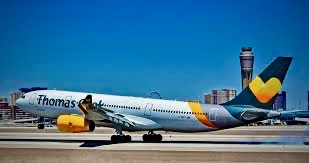Cooking the Bookings.
Latest tourism outfit to fold like a beach chair? Witness the sudden collapse of Thomas Cook Group.
Great Britain’s oldest, largest tour company announced last Monday that it has “ceased trading with immediate effect”, albeit with many of its planes still in the air. This corporate dive bomb has resulted in all TC flight cancellations and closed booking shops—stranding 155,000 travelers across Europe, Asia, Africa and the Americas. Some 650,000 globetrotters were otherwise impacted worldwide, amid the usual long airport wait lines and terminal disruption.
Scrambling Up the Matterhorn.
With the 178 year-old company tanking, Britain’s Department for Transportation and Civil Aviation Authority hastily set up Operation Matterhorn to evacuate displaced TC ‘holiday makers’ and safely repatriate them en masse to the UK.
CAA’S Atol scheme (a £170m fund paid for through industry levies) provides overnight accommodations and flights home for Cook’s package tour customers, as well as refunds on upcoming holiday bookings. Still, vacation-dashed, coach-class ‘Cookies’ stand to lose  hundreds and thousands of pounds overall, while being issued vouchers that are proving to be worthless. Those not qualifying for Atol evacuation and other neon green-vested assistance are at the mercy of travel insurance or credit card companies, likely transported via alternate flights of over 50 cooperating carriers (including Atlas Air and Condor charters), if they’re lucky. Otherwise mere plane ticket buyers may be scrambling for alternative lodging and flight arrangements on their own dime.
hundreds and thousands of pounds overall, while being issued vouchers that are proving to be worthless. Those not qualifying for Atol evacuation and other neon green-vested assistance are at the mercy of travel insurance or credit card companies, likely transported via alternate flights of over 50 cooperating carriers (including Atlas Air and Condor charters), if they’re lucky. Otherwise mere plane ticket buyers may be scrambling for alternative lodging and flight arrangements on their own dime.
History of Railroading.
Whaahappened? Thomas Cook, a Baptist Missionary, launched his tour company in rural Leicestershire circa 1841 to conduct railway outings, preaching the dangers of liquor to moneyed Victorians. The mass tourism pioneer grew to become a global tourism colossus with sales of £9b annually, 19 million customers in 16 countries, an integrated holiday company (booking, flights and hotels) offering budget-minded middle class tourists low-cost holiday packages to popular, beachy locales.
High Flying TC was essentially nationalized by British Railways in 1948, yet nearly went belly up in 2011. The tour company was saved then only by an emergency loan primarily from the Royal Bank of Scotland. It is that very institution and its co-signers that now demand a £200m kicker on a £450m refinancing plan led by China’s conglomerate, Fosun, Cook’s largest current shareholder.
That caused the British government to scotch the entire £1.1b loan package, letting the tour company go into compulsory bankruptcy, with perhaps TC’s most valuable asset being its landing slots. Panicked customers and suppliers drained the company’s ready cash in final weeks. Even a £900m rescue deal with Fosun last August couldn’t save the sinking Thomas Cook brand.
Analysts say current troubles really began back in 2007, when growth-driven Cook merged with holiday tourist business, MyTravel, bringing it that tour operation and its aircraft. Then it bought Cooperative Travel’s 1,400 retail shops in 2010—right when online travel booking began taking off. Cook wrote off £1.1b from the ill-conceived MyTravel deal in May, 2019, and is still stuck with its over 500 ‘high street’ stores.
Meanwhile Cook’s 2019 profits have plunged thus far, capping an up and down fiscal decade rife with self-inflicted wounds, leaving the company £1.6b in debt, with top heavy, overpaid management and worthless shares, high-summer suppliers and hoteliers yet to be paid. It’s also been reported that investors continued receiving dividends through November, 2018, and that several hedge funds make out like bandits now, having bought credit-default swap protection—which pays out after TC’s liquidation.
 So TC’s doors are now shuttered, 34 A321 and 330 aircraft have been impounded in place, over 22,000 jobs have been jettisoned. Although its international operations in India, China, Germany and Scandinavia may continue to trade as independent entities.
So TC’s doors are now shuttered, 34 A321 and 330 aircraft have been impounded in place, over 22,000 jobs have been jettisoned. Although its international operations in India, China, Germany and Scandinavia may continue to trade as independent entities.
Cook’s abandoned holiday makers have been told they will be evacuated by Atol and other, cooperating carriers between September 23 and October 6. TC’s package customers are ostensibly assured refunds for cancelled trips and repatriation to Britain free of charge. Those poor Cookies having booked future trips can seek refunds as part of Matterhorn’s repatriation program—but good luck with all that.
Underjuiced and OverCooked.
Tourism industry watchers conclude that Thomas Cook was an analog relic derailed by the digital future—the end of a brick and mortar era, brick by brick—since travelers can book their own trips online anymore. Others note the declining interest in such package tours overall, amid intense competition from the likes of RyanAir, easyJet and German tour group rival, Tui. Then there are today’s terrorism, weather extremes, worldwide trade sanctions and Brexit tears, coupled with a free-falling British pound.
In any case, Thomas Cook appears to have been a wrung-dry, born of temperance dinosaur (viz. Tourannosauraus Wrecks) drowning in a sea of post-tourism indulgences.
We’ll drink to that, eyes peeled over the flagon…
